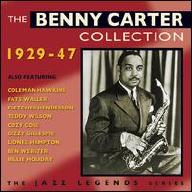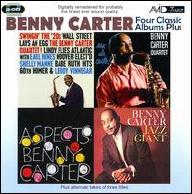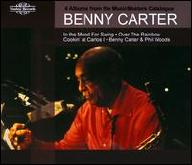Essentially self-taught, Benny Carter started on the trumpet and, after a period on C-melody sax, switched to alto. In 1927, he made his recording debut with Charlie Johnson's Paradise Ten. The following year, he had his first big band (working at New York's Arcadia Ballroom) and was contributing arrangements to Fletcher Henderson and even Duke Ellington. Carter was with Henderson during 1930-1931, briefly took over McKinney's Cotton Pickers, and then went back to leading his own big band (1932-1934). Already at this stage he was considered one of the two top altoists in jazz (along with Johnny Hodges), a skilled arranger and composer (Blues in My Heart was an early hit and would be followed by When Lights Are Low), and his trumpet playing was excellent; Carter would also record on tenor, clarinet (an instrument he should have played more), and piano, although his rare vocals show that even he was human.
In 1935, Benny Carter moved to Europe, where in London he was a staff arranger for the BBC dance orchestra (1936-1938); he also recorded in several European countries. Carter's Waltzing the Blues was one of the very first jazz waltzes. He returned to the U.S. in 1938, led a classy but commercially unsuccessful big band (1939-1941), and then headed a sextet. In 1943, he relocated permanently to Los Angeles, appearing in the film #Stormy Weather (as a trumpeter with Fats Waller) and getting lucrative work writing for the movie studios. He would lead a big band off and on during the next three years (among his sidemen were J.J. Johnson, Miles Davis, and Max Roach) before giving up on that effort. Carter wrote for the studios for over 50 years, but he continued recording as an altoist (and all-too-rare trumpeter) during the 1940s and '50s, making a few tours with Jazz at the Philharmonic and participating on some of Norman Granz's jam-session albums. By the mid-'60s, his writing chores led him to hardly playing alto at all, but he made a full "comeback" by the mid-'70s, and maintained a very busy playing and writing schedule even at his advanced age. Even after the rise of such stylists as Charlie Parker, Cannonball Adderley, Eric Dolphy, Ornette Coleman, and David Sanborn (in addition to their many followers), Benny Carter still ranks near the top of alto players. His concert and recording schedule remained active through the '90s, slowing only at the end of the millenium. After eight amazing decades of writing and playing, Benny Carter passed away quietly on July 13, 2003 at a Los Angeles hospital. He was 95. ~ Scott Yanow, Rovi
















